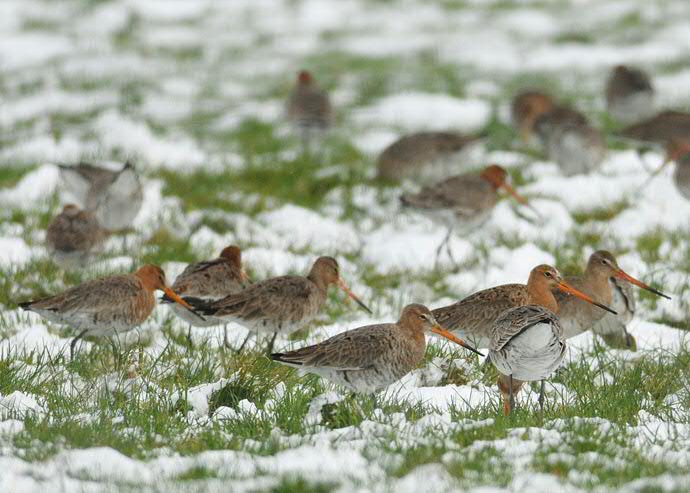Godwits turn 2013's extremely cold spring into a success

B lack-tailed godwits are able to cope with unpredictable weather. This was revealed by a thorough analysis of the extraordinary spring of 2013 by ecologist Nathan Senner of the University of Groningen and an international group of colleagues. In 2013, godwits were surprised by an exceptionally cold spring upon their return to the Netherlands. Many birds even returned temporarily to warmer climes. It turns out that the godwits had a particularly productive breeding season that year, however, writes Senner in the Journal of Animal Ecology, which appear on 29 May 2015.
In March 2013, the temperatures in large parts of Western Europe suddenly dropped by more than ten degrees. Three weeks of extremely low temperatures followed, with large amounts of snow falling even as far south as the middle of France.
Postponement
Observations of individually colour-marked black-tailed godwits revealed that some of the birds postponed their arrival at their breeding territories by more than three weeks. Others left the unseasonably cold province of Friesland and travelled as many as 250 kilometres back south. In addition, Senner and his colleagues observed that the birds that remained in Friesland spent over a third more time than usual searching for food.
Positive effect
Nevertheless, in 2013, the godwits raised more young than in other years. For example, in the Frisian study area, 51% of the chicks survived the spring, as opposed to 30% in 2014. The apparent positive effect of the extreme spring of 2013 is explained by Senner as the result of a better match between the emergence of insects in the grasslands and the hatching of the godwit chicks. 'There are clear indications that climate change has resulted in insects peaking too early for godwit chicks', says Senner. 'That "mismatch" was less significant in 2013.'
Bird Reserves
It thus appears that godwits can cope with extreme weather. 'That is good news because the climate models are predicting that extreme weather will occur more frequently', says Senner. 'But we must not forget that the birds have to eat more to counteract these events. They did that in nature reserves in particular. The birds that returned south mainly stayed in nature reserves as well. The godwit's flexibility may thus be good news, but there still needs to be sufficient high-quality habitat available to which the birds can retreat.'
Citizen Scientists
The research was possible thanks to the many volunteer citizen scientists who observed, recorded and passed on their sightings of colour-marked godwits in the field. 'Nearly 600 colour-marked godwits were reported during the spring of 2013. We couldn't do our work without these volunteers', emphasizes the researcher.
Further information:
- Contact: Dr Nathan Senner, n.r.senner@rug.nl. Nathan Senner is in Illinois, US until 30 July, contactable via Skype on nrsenner, tel. 503-688-8735 or the research leader and final author Prof. Theunis Piersma, Theunis.Piersma@nioz.nl.
- The article, 'When Siberia came to The Netherlands: the response of continental black-tailed godwits to a rare spring weather event', is available online from 29 May in the Journal of Animal Ecology. DOI: 10.1111/1365-2656.12381
Nathan R. Senner1, Mo A. Verhoeven1, José M. Abad-Gómez2, Jorge S. Gutiérrez2,3, Jos C. E. W. Hooijmeijer1, Rosemarie Kentie1, José A. Masero2, T. Lee Tibbitts4 andTheunis Piersma1,3
1Conservation Ecology Group, Groningen Institute for Evolutionary Life Sciences (GELIFES), University of Groningen; 2Department of Marine Ecology, NIOZ Royal Netherlands Institute for Sea Research; 3Conservation Biology Research Group, Department of Anatomy, Cell Biology and Zoology, University of Extremadura, Spain; 4U.S. Geological Survey Alaska Science Center, Anchorage, Alaska, USA
